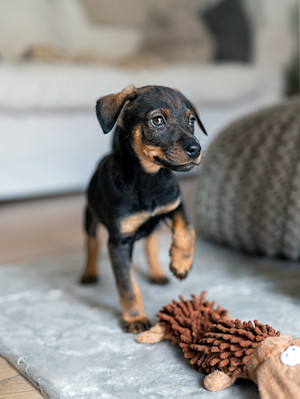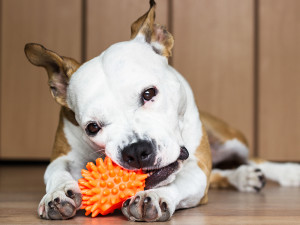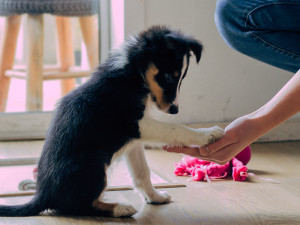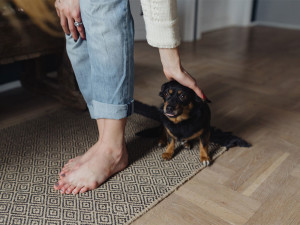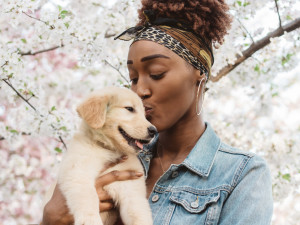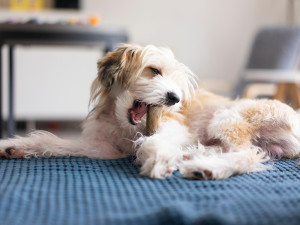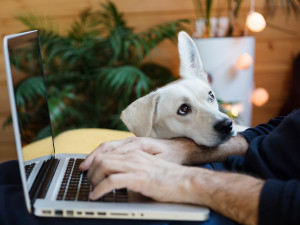How Long Can a Puppy Be Left Alone?
Because you have to go places sometimes.

Share Article
In This Article:
Age-Based Guidelines for Leaving Puppies Alone How Long Can Puppies Be Left Alone in a Crate? Separation Anxiety in Puppies How to Leave a Puppy Home Alone Frequently Asked Questions
The length of time a puppy can be left alone largely depends on their age. As a general rule, puppies may be able to be left alone for one hour per month of age (up to eight to 10 hours max for adult dogs). However, temperament, training, and preparation play huge roles in successful alone time.
Newborn puppies need frequent care, feeding, and supervision. This is usually managed by their mom, but orphaned puppies will need someone to support them through their first weeks of life. This involves feeding every couple of hours, managing their environment, and stimulating urination and defecation. Bottle-raising a puppy is a round-the-clock job, but it can be rewarding if you’re able to put in the work.
Puppies are usually first adopted when they’re a little more independent, at around eight to twelve weeks of age. These young pups still need a lot of care and supervision but can handle a little more time on their own, especially if it’s introduced gradually. After the initial introduction and excitement of adopting a puppy has worn off, you may wonder, “When can I leave my puppy home alone?” After all, you can’t live off Uber Eats forever.

Age-based guidelines for leaving puppies alone
Adding a puppy to your home can feel like a new chapter in your life. As much as you’d love to spend every second of the day with them by your side, there will be times when you need to be apart. But how long can you leave a puppy alone?
Every puppy is different, but a general rule of thumb that people use says that you can leave a puppy alone for a number of hours equal to their age in months, up to eight to ten hours. Many factors come into play with this: house training, food or medication needs, crate training, and anxiety, to name a few. It’s important to recognize that every puppy is going to adjust to a new home at their own pace and not rush things based on an expectation that may not fit their needs.
How long can puppies be left alone in a crate?
Puppies can spend their time alone in a crate to make sure they’re in a space where they can’t cause trouble or get injured. Getting your puppy started on crate training early can greatly improve both of your lives. The goal is to get your puppy to see the crate as a safe place where they can rest, not as a place they go when they’re being punished. Creating positive associations with the crate takes time and patience.
How to introduce a puppy to staying in a crate
The way to help your puppy get comfortable with their crate is simple: Give lots of treats and lots of positive attention. Get them interested in the crate by putting food or treats inside for them to discover. Let them explore the space without closing the door or making a big deal out of it, so they associate it with only positive things.
As they’re getting comfortable with the crate, you can begin feeding them in there. Try leaving the room and coming back while they’re in the crate to introduce them to the idea of you leaving. Eventually, you can begin closing the door for short periods and gradually lengthening the time apart.
What to do if your puppy won’t stay in a crate
Some puppies can be very difficult to get acclimated to a crate, but it’s still important to keep your puppy confined to an area where they can’t get into trouble while you’re gone. Try out alternatives like a puppy pen, cordoning off areas with baby gates, or finding a bare room where they’re comfortable resting. Again, introduce changes slowly and find out what works for your puppy.
How long can a puppy hold their bladder?
Potty training is a big part of leaving your puppy alone. No one wants to come home to find accidents in the house. Always take your puppy outside to potty before you leave them alone. In their first months of life, puppies can usually hold their pee for only two to three hours. They’ll be able to stretch this time as they grow, but it’s a good idea to not push their boundaries. Good potty training relies on setting a pattern of expected trips outside before your puppy needs to pee.
Expect that accidents will happen, especially in your first weeks together. It’s important to not get angry or punish your puppy for peeing or pooping in the house. They won’t understand or make the connection you’re hoping for, and they’ll just learn to be afraid of you. Instead, clean up the mess and promise to get your puppy outside earlier next time.
Separation anxiety in puppies
Almost all puppies are going to whine, bark, or show some evidence of being upset when they’re first left alone. This is normal behavior and doesn’t mean that your puppy has separation anxiety and will never adjust to being on their own. Most will gradually reduce their complaints as they adjust to the routine, but some may stay abnormally anxious throughout the time away from their parents.
If you suspect your puppy isn’t settling down after you’re gone, set up a video camera to record them so you can see what behaviors they’re exhibiting and for how long. Symptoms of separation anxiety in dogs can include:
Vocalization (whining, barking, howling)
Trembling
Destructive behaviors
Urination or defecation
Restlessness
Salivation
Clinginess
These behaviors may show up when you’re preparing to leave or while you’re gone. If you’re concerned about separation anxiety in your puppy, talk with your vet or a veterinary behaviorist. Behavioral therapy and medications can help dogs get over this harmful behavior.
What age do puppies get separation anxiety?
Young puppies can develop separation anxiety or separation-related distress. There’s no minimum age, but it often first appears when puppies are three to four months old and just starting to be left on their own in a new home.
Do puppies get over separation anxiety?
With training, conditioning, and sometimes medication, puppies can get over separation anxiety. If you’re concerned about separation anxiety in your puppy, talk to your vet early. It’s best to start strategies to break the cycle of anxiety before they become long-term issues. Don’t just assume your puppy will grow out of it on their own.
How to leave a puppy home alone
It’s a sad fact of life that most pet parents need to work so they can get their new puppy toys, food, vet care, plush beds, and trips to the groomer. Figuring out how to leave a puppy home alone while at work can be a challenge, especially early on. Start off with a short time (especially when your puppy is small) and work up gradually as your puppy grows. Some care strategies for leaving your puppy home when you’re away include:
Creating a safe environment
Puppies are mischievous and may try to play with or destroy anything they can find. Make sure their space doesn’t have access to toxic plants or foods, is away from stairs or high surfaces, and is free of electrical cords or other dangers. Restricting your puppy to a crate, pen, or small room is the best way to keep them out of trouble.
Providing mental stimulation
Some puppies may appreciate a radio or TV playing something calming to provide some noise and distraction. Indestructible toys (sometimes with a difficult-to-access treat hidden within) can provide an opportunity for play and stimulation as well.
Monitoring your puppy’s response
Using a video monitor can help you keep track of how your puppy is handling their alone time. You can see what they’re interested in doing while you’re away and adjust their environment to help keep them occupied while you’re gone. The hope is that your puppy will spend most of your time apart sleeping or relaxing.
FAQs (People also ask):
How to keep your puppy relaxed when leaving them alone?
Strategies for keeping puppies relaxed when left home alone include providing a safe, familiar environment, using a pheromone collar to reduce stress, and using positive reinforcement to introduce them to the idea that being alone is OK.
How to keep your puppy entertained while you’re at work?
There are many ways to provide distractions for your puppy while you’re away, including treat puzzles, indestructible toys, and activity stations. You can set up a video monitor to see what your puppy plays with and adjust to their preferences.
References:
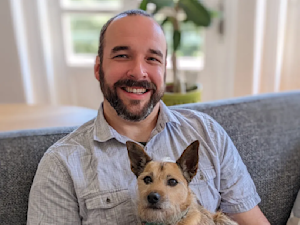
Dr. Bartley Harrison, DVM
Dr. Bartley Harrison is a veterinarian with more than 19 years of experience. He has treated a variety of species in emergency and speciality practices for both large and small animals. His primary interests as a vet are emergency medicine and critical care.
Related articles
![Puppy playing at home with his toy alone.]()
Tips for Leaving Your Puppy Home Alone for the First Time
![Border Collie puppy shaking owner's hand]()
When to Start Training a Puppy: a Complete Puppy Training Schedule By Age
Your puppy training schedule, from eight weeks to six months. Let’s do this.
![woman petting small dog that is feeling stressed]()
Stressed Pets: How to Keep Your Dogs Relaxed When Leaving Them Alone
Tips on helping a dog deal with their daily stress.
![woman draped in an orange blanket holds a black-and-white puppy]()
5 Development Stages You Should Know When You Get a Puppy
It’s like What to Expect When You’re Expecting, except add “four little paws to run around your house” to the title.
![Dog lying on blanket, chewing on a bone]()
Long-Lasting Chew Toys Are Key to Keeping Solo Dogs Happy
New research shows that chewing (toys, not shoes) reduces stress in dogs left home alone.
![Dog Seeking Attention Owner Working On Laptop.]()
Why Is My Dog Being Clingy?
Your dog’s Velcro habits are cute—but not always convenient.

